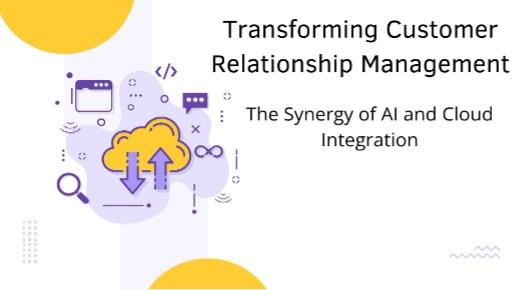Transforming Customer Relationship Management: The Synergy of AI and Cloud Integration
The fusion of Artificial Intelligence (AI) with cloud computing is revolutionizing Customer Relationship Management (CRM) systems. According to Davinder Pal Singh, a technical architect specializing in innovative technologies, this integration is reshaping the way businesses engage with customers and optimize operations. His analysis highlights a transformative shift that positions CRM systems as critical drivers of digital success.
Cloud-Driven Scalability and Real-Time Capabilities
Cloud computing has elevated CRM systems with unmatched scalability and reliability. Distributed architectures achieve fault tolerance rates of 99.995%, ensuring seamless operations even under high loads. Microservices architecture, a cornerstone of modern CRM, allows businesses to deploy new features within minutes, drastically reducing operational downtime.
Edge computing has further revolutionized CRM performance by processing customer interactions closer to the source. This reduces latency to just 11.5 milliseconds, enabling platforms to manage millions of interactions in real time. These advancements equip businesses to handle customer demands with speed, precision, and resilience.
AI-Powered Personalization and Analytics
AI integration has redefined CRM systems by enabling advanced personalization and predictive insights. Natural Language Processing (NLP) tools achieve over 92% accuracy in intent recognition, allowing businesses to respond effectively to customer queries. Predictive analytics further enhance CRM capabilities, with models achieving 84% accuracy in churn prediction and a 76% improvement in sales forecasting.
AI’s ability to analyze customer behavior and preferences empowers organizations to deliver tailored experiences. Sentiment analysis and behavioral predictions enable businesses to address customer needs proactively, boosting satisfaction, retention, and lifetime value. These capabilities shift CRM systems from reactive tools to proactive enablers of strategic engagement.
Automation: The Efficiency Catalyst
Automation is transforming CRM operations by streamlining workflows and reducing manual effort. Modern systems automate 91.5% of standard processes, significantly lowering error rates to just 0.18%. Intelligent routing mechanisms analyze millions of decisions daily with an accuracy of 95.9%, ensuring efficient resolution of customer inquiries.
These advancements translate to a 46% reduction in resolution times and a 38% improvement in first-contact resolution rates. Businesses benefit from lower operational costs and improved productivity, enhancing the customer experience while maximizing resource efficiency.
Enhancing Data Security and Management
Data security and management are foundational to modern CRM systems. Advanced encryption protocols like AES-256 safeguard sensitive customer information with minimal performance impact. Role-based access controls (RBAC) add another layer of security, managing thousands of roles and permissions with an accuracy rate of 99.995%.
Modern CRM platforms process up to 1.2 million events per second while ensuring data consistency rates of 99.995%. Predictive caching and in-memory computing enable faster data retrieval, supporting real-time interactions while maintaining data integrity. These features ensure that businesses can meet regulatory requirements and protect customer trust.
Emerging Technologies Shaping the Future
Emerging technologies like quantum computing and IoT integration are set to further revolutionize CRM systems. Quantum algorithms have demonstrated the ability to process complex datasets at speeds up to 142 times faster than conventional methods, enhancing decision-making and customer segmentation.
IoT integration enables real-time connectivity with customer devices, providing deeper insights into behavior and facilitating proactive solutions. For example, predictive maintenance and personalized recommendations enhance customer engagement and streamline operations. These technologies promise to expand the potential of CRM platforms, making them even more integral to business growth.
In conclusion, Davinder Pal Singh's exploration of AI and cloud integration in CRM highlights a transformative shift toward efficiency, personalization, and security. These advancements address challenges and unlock opportunities, positioning CRM systems as vital tools in the digital age. As technologies like quantum computing and IoT evolve, the insights provide a clear roadmap for leveraging these innovations to drive growth and enhance customer relationships.


Comments are closed.